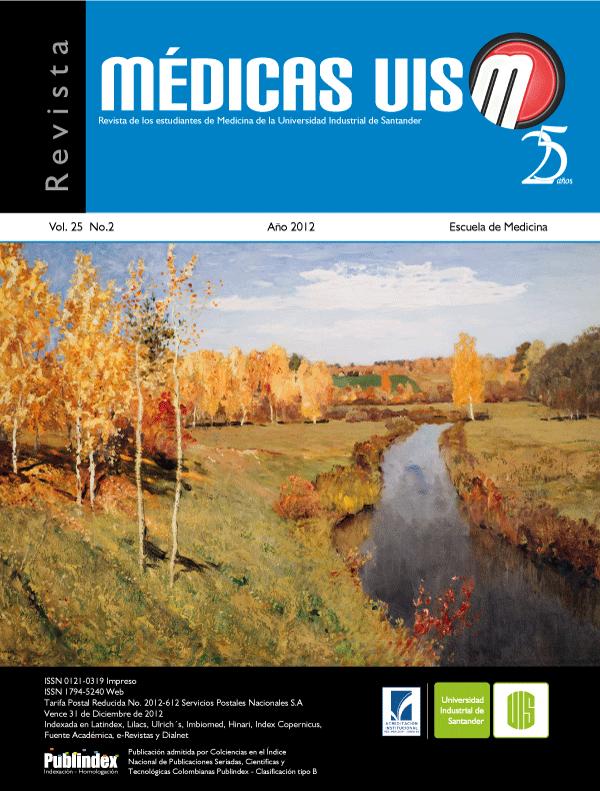Abstract
Elderly patients represent a significant percentage of the population suffering from oncological diseases, leading to a challenge in making decisions. That since functional assessment scales traditionally used in oncology as the Karnofsky performance status and Eastern Cooperative Oncology Group fail side conditions such as frailty, cognitive impairment, depression and dependence in activities of daily living that predict a reduced tolerance to medical treatment and are associated with higher mortality. Comprehensive geriatric assessment covers each of these aspects and allows the design of comprehensive plans of care and rehabilitation, forcing the involvement of geriatricians in the multidisciplinary teams that manage these patients. There are tools such as the Vulnerable Elders Survey 13 with sufficient sensitivity to allow in short time to identify those elderly who will benefit from a broader assessment to determine their best treatment. (MÉD.UIS. 2012;25(2):121-8)
References
2. Murthy VH, Krumholz HM, Gross CP. Participation in cancer clinical trials: Race-, sex-, and age-based disparities. JAMA. 2004;291:2720-6.
3. Extermann M, Hurria A. Comprehensive Geriatric Assessment for Older Patients with Cancer. J Clin Oncol. 2007;25:1824-31.
4. Extermann M. Studies of Comprehensive Geriatric Assessment in Patients with Cancer. Cancer Control .2003;10(6):463-8.
5. Inouye SK, Pedizzi PN, Robison JT, et al. Importance of functional measures in predicting mortality among older hospitalized patients. JAMA. 1998;279:1187-93.
6. Terret C, Zuliam G, Naiem A, Albrand G. Multidisciplinary Approach to the Geriatric Oncology Patient. J Clin Oncol. 2007;25:1876-81.
7. Rubenstein LZ, Rubenstein LV. Multidimensional Geriatric Assessment. In: Howard M, Rockwood K, Woodhouse K. Brocklehurst’s Textbook of Geriatric Medicine and Gerontology. Saunders Elsevier ed. Philadelphia. 7th ed. 2010. pp. 211-7.
8. Wieland D, Hirth V. Comprehensive Geriatric Assessment. Cancer Control 2003;10(6):454-62
9. Rodin M, Mohile S. A Practical Approach to Geriatric Assessment in Oncology. J Clin Oncol. 2007;25:1936-44.
10. Monfardini S, Gridelli C, Pasetto L, Soubeyran P, Droz JP, Basso U. Vulnerable and frail elderly: An approach to the management of the main tumour types. Eur J of Cancer. 2008;44:488-93.
11. Mohile SG, Bylow K, Dale W, et al. A pilot study of the Vulnerable Elders Survey-13 compared with the comprehensive geriatric assessment for identifying disability in older patients with prostate cancer who receive androgen ablation. Cancer. 2007;109:802-10.11. Luciani A, Ascione G, Bertuzzi C, et al. Detecting Disabilities in Older Patients With Cancer: Comparison Between Comprehensive Geriatric Assessment and Vulnerable Elders Survey-13. J Clin Oncol. 2010;28:2046-50.
12. Monfardini S, Basso U, Fiduccia P, Brunello A, Baretta Z, Soldà C, et al. Can the short screening test Vulnerable Elders Survey 13 (VES-13) substitute for the time-consuming comprehensive geriatric assessment (CGA) to identify vulnerable/frail elderly breast cancer patients? J Clin Oncol. 2010. (suppl;9114)28:15s.
13. Saliba D, Elliott M, Rubenstein LZ, et al. The Vulnerable Elders Survey: A tool for identifying vulnerable older people in the community. J Am Geriatr Soc. 2001;49:1691-9.
14. Rockwood K, Mitnitski A. Frailty Defined by Deficit Accumulation and Geriatric Medicine Defined by Frailty. Clin Geriatr Med. 2011;27: 17–26.
15. Balducci L. New Paradigms for Treating Elderly Patients With Cancer: The Comprehensive Geriatric Assessment and Guidelines for Supportive Care. J Support Oncol. 2003;1:30–37.
16. Fried LP, Tangen CM, Walston J, et al. Frailty in older adults: evidence for a phenotype. J Gerontol A Biol Sci Med Sci. 2001;56:M146–M156.
17. Ensrud K, Ewing S, Cawthon P y cols. A Comparison of Frailty Indexes for the Prediction of Falls, Disability, Fractures and Mortality in Older Men. J Am Geriatr Soc. 2009;57(3): 492–8.
18. Kumar S, Katheria V, Hurria A. Evaluating the Older Patient with Cancer: Understanding Frailty and the Geriatric Assessment. Cancer J Clin. 2010; 60:120-2.
19. Repetto L, Fratino L, Audisio R y et al. Comprehensive Geriatric Assessment Adds Information to Eastern Cooperative Oncology Group Performance Status in Elderly Cancer Patients: An Italian Group for Geriatric Oncology Study. J Clin Oncol. 2002;20(2):494-502.
20. Soejono C. The role of comprehensive geriatric assessment (CGA) in the management of stage 3 hepatocellular carcinoma in the elderly. Crit Rev Oncol Hematol. 2006; 60:S20
21. Freyer G, Geay JF, Touzet S, et al. Comprehensive geriatric assessment predicts tolerance to chemotherapy and survival in elderly patients with advanced ovarian carcinoma: a GINECO study. Annals of Oncology 2005; 16:1795–800.
22. Clough-Glorr K, Stuck A, Thwin S y Silliman R. Older Breast Cancer Survivors: Geriatric Assessment Domains Are Associated With Poor Tolerance of Treatment Adverse Effects
